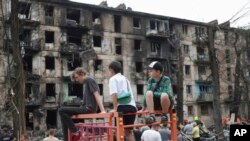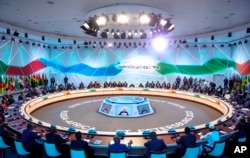At the end of a two-day Africa summit in St. Petersburg on July 29, Russian President Vladimir Putin addressed accusations that his government has been abducting children from Ukraine.
When asked about the African leaders’ proposal to mediate Russia’s peace negotiation with Ukraine, Putin said one of the aspects of the African peace plan was the situation with Ukrainian children:
“You know those actually inflated stories about child abduction. We explain it simply: there was no kidnapping; there was an attempt and specific actions aimed at saving the children, who were taken out of the war zone.”
“There are no problems here at all. It’s an invented story.”
That is false.
Putin and his Presidential Commissioner for Children's Rights, Maria Lvova-Belova, are facing charges of genocide for their alleged role in those abductions. In March, the International Criminal Court (ICC) issued a warrant for their arrest.
Lvova-Belova reported to Putin on July 30 that Russia “has received” 700,000 Ukrainian children. The numbers cited in that report have not been independently verified.
International humanitarian law prohibits the evacuation of children “by a party to the armed conflict,” although temporary evacuations are permissible to preserve health and safety. Parental consent is also required.
The International Commission of Inquiry on Ukraine, established by the United Nations Human Rights Council, said Russia had failed to satisfy the requirements set forth by international humanitarian law in the cases it had examined.
Ukrainian authorities have identified 19,546 Ukrainian children who have been deported or forcibly displaced, although the exact figure is likely much higher.
The overwhelming majority of them were taken from Russian-occupied regions in southern and eastern Ukraine.
A report released in May by the Organization for Security and Co-operation in Europe’s (OSCE) Office for Democratic Institutions and Human Rights said the most common reasons indicated for the organized displacement of children were security concerns, adoption or foster care, and temporary stays in so-called recreation camps.
The OSCE mission found that while Russia had evacuated some children in line with international humanitarian law, Moscow had also engaged in “non-consensual evacuations, transfers and prolonged displacement of Ukrainian children.”
“Whatever the form of placement, Ukrainian children are exposed to pro-Russian information campaigns often amounting to targeted re-education,” the OSCE report stated. “The Russian Federation does not take any steps to actively promote the return of Ukrainian children. Rather, it creates various obstacles for families seeking to get their children back.”
That has been corroborated by other witness accounts and media reports.
An Associated Press investigation published in March, which drew on dozens of witness interviews, Russian documents and other sources, confirmed that Russia has “deported Ukrainian children to Russia or Russian-held territories without consent, lied to them that they weren’t wanted by their parents, used them for propaganda, and given them Russian families and citizenship.”
A September 2022 Human Rights Watch report documented how many Ukrainians “hoping to go to Ukrainian-controlled territory” after Russian forces moved in were instead “transported to Russia in organized mass transfers … in a manner and context that renders them illegal forcible transfers.”
In August 2022, authorities in Krasnodar, southern Russia, announced that “more than 1,000 babies” sent to Russia from the Russian-occupied Ukrainian city of Mariupol had been adopted by families throughout Russia.
Ukraine called that a “gross violation of the Geneva Conventions.”
Human Rights Watch said that “inter-country adoption is prohibited during armed conflict.”
The ICC based its warrant on the logistical complexity and scope of official involvement in the transfers at every level of the Russian state.
In February, a report by the Yale School of Public Health’s Humanitarian Research Lab (Yale HRL) identified 43 facilities where at least 6,000 Ukrainian children had been “systematically relocated.”
Yale HRL said Lvova-Belova headed the “multi-faceted operation” to transport and house Ukrainian children at the federal level, while Putin “personally appointed” many of those involved in the program.
Forcibly transferring children from one national, ethnic, racial and/or religious group to another may constitute an act of genocide under the Genocide Convention.
Yale HRL said at least 32 (78%) of those camps appeared to be “engaged in systematic re-education efforts that expose children from Ukraine to Russia-centric academic, cultural, patriotic, and/or military education.”
Russia has also taken children from areas of Ukraine it occupies to camps for "military-patriotic" training.
A December 2022 report from the VOA-affiliated Russian-language network Current Time described Chechnya as “the main Russian center for ‘military-patriotic’ children's camps.”
Along with Russian youths, Current Time reported that 45 "difficult-to-raise teenagers” from Russia-occupied Luhansk and Donetsk had been brought to the so-called “Forces of the Caucasus" camp, where they underwent military and patriotic education.
Yale HRL said approximately 50 Ukrainian children attended another camp, in Russia-occupied Crimea, called the “School of Future Commanders.” It was organized by Russia’s Youth Army (Yunarmiya), which is funded by the Russian Defense Ministry.
Chechen human rights activist Abubakar Yangulbaev accused the authorities of raising a “children’s army.” He said many of those sent to the camp are aged 16-17, and could theoretically be sent to fight in Ukraine.
“It is not only about physical, but also ideological training. Children were taken from Ukraine to be taught to hate Ukrainians,” Yangulbaev told Current Time.
On April 27, the Parliamentary Assembly of the Council of Europe (PACE) voted to designate Moscow’s kidnapping and deportation of Ukrainian children to Russia as “genocide.”
PACE said the transfers of Ukrainian children were “clearly being planned and organized in a systematic way” by the Russian state. It said the children were being subjected to a process of “russification” through re-education and exposed to propaganda, with the goal of “annihilating every link to and feature of their Ukrainian identity."







